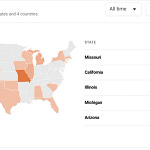
This episode of On Culture starts from the most recent written piece from The Embassy - Why So Serious?
Here is an excerpt …
As I was in the process of collecting my thoughts for this essay, I noticed a number of pieces that are noticing the same trend. In the wake of the 2016 election, there were a number of attempts to explain the Angry Right. Strangers in Their Own Land was a National Book Award finalist in 2018 and explored this phenomenon - the righteous anger of the victim and the deadly struggle to right the wrong. We see, of course, much the same thing on the left. Ross Douthat recently asked Can the Left Be Happy? - an example of a column that doesn’t really match the title. Douthat is noticing what I am noticing (I swear I started to write this before I read his piece. More on this in a bit) - that many on the left, mirroring those on the right but for slightly different reasons, don’t think happiness is what we should be feeling right now.
The smartphone theory of increasing youth unhappiness has been especially in the news this past week, thanks to Jonathan Haidt’s new book, “The Anxious Generation: How the Great Rewiring of Childhood Is Causing an Epidemic of Mental Illness.” And it’s been striking how certain critiques of Haidt’s theory from the left seem to object to the idea that youth unhappiness could be anything but rational and natural.
Ross Douthat - The New York Times - April 6, 2024
Unhappiness is rational, natural, and … right. Again, why are you laughing at x when y is happening in the world?
Kevin D. Williamson, just last week, wrote in The Dispatch a better (though longer) version of what I am trying to write here. His piece is called Humor is a Cool Medium. In it, Williamson observes,
Humor requires emotional distance rather than emotional urgency, dispassionate observation rather than cheerleading and sermonizing, cool wit rather than scalding rage … When humor is instrumentalized for political purposes—when it stops being art and is degraded to the state of rhetoric—it is used for one thing only: lowering the relative status of disfavored groups.
Kevin D. Williamson - The Dispatch - May 24, 2024
Humor being instrumentalized for political purposes describes much of late night comedy. It stops being art because it isn’t trying to be. It is used to lower the relative status of disfavored groups. One more bullet in the culture war.
As I mentioned, if you look at the links below, you will notice that a number of people sensed the appropriateness of this sort of question at about the same time I did. What does that mean? I don’t know - but it may be a hopeful trend.
In the Wisdom book of Ecclesiastes, wrestling with the meaning of life in a world that was by every circumstantial measure (child mortality, disease, war, starvation …) much more difficult that here and now, we read -
There is a time for everything,
and a season for every activity under the heavens:
a time to be born and a time to die,
a time to plant and a time to uproot,
a time to kill and a time to heal,
a time to tear down and a time to build,
a time to weep and a time to laugh,
a time to mourn and a time to dance,
a time to scatter stones and a time to gather them,
a time to embrace and a time to refrain from embracing,
a time to search and a time to give up,
a time to keep and a time to throw away,
a time to tear and a time to mend,
a time to be silent and a time to speak,
a time to love and a time to hate,
a time for war and a time for peace.
Ecclesiastes 3:1-8
There is a time to weep and to mourn and to tear. There is. We should recognize that. But there is a time to dance and embrace and laugh. The person who always laughs and the one who never does has lost perspective, has cut themselves off from at least part of reality. There is wrong in this world. Humor can help highlight it in a unique way. Laughter is good. Perpetual anger isn't a virtue. And the world has been measurably worse in almost every measurable way in almost every other time and place than here and now. It is ok to recognize and mourn and even work against what is wrong and unjust in this world. But we should not draw any moral status by the depth of our indignation.
…
Read the whole piece here.












Share this post